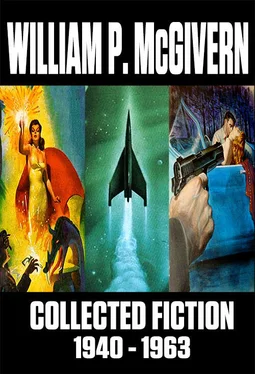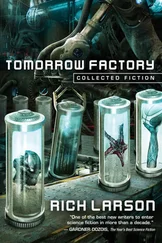Уильям Макгиверн - Collected Fiction - 1940-1963
Здесь есть возможность читать онлайн «Уильям Макгиверн - Collected Fiction - 1940-1963» весь текст электронной книги совершенно бесплатно (целиком полную версию без сокращений). В некоторых случаях можно слушать аудио, скачать через торрент в формате fb2 и присутствует краткое содержание. Год выпуска: 2014, Издательство: Jerry eBooks, Жанр: Ужасы и Мистика, Фантастика и фэнтези, Детектив, Прочие приключения, на английском языке. Описание произведения, (предисловие) а так же отзывы посетителей доступны на портале библиотеки ЛибКат.
- Название:Collected Fiction: 1940-1963
- Автор:
- Издательство:Jerry eBooks
- Жанр:
- Год:2014
- ISBN:нет данных
- Рейтинг книги:3 / 5. Голосов: 1
-
Избранное:Добавить в избранное
- Отзывы:
-
Ваша оценка:
- 60
- 1
- 2
- 3
- 4
- 5
Collected Fiction: 1940-1963: краткое содержание, описание и аннотация
Предлагаем к чтению аннотацию, описание, краткое содержание или предисловие (зависит от того, что написал сам автор книги «Collected Fiction: 1940-1963»). Если вы не нашли необходимую информацию о книге — напишите в комментариях, мы постараемся отыскать её.
Collected Fiction: 1940-1963 — читать онлайн бесплатно полную книгу (весь текст) целиком
Ниже представлен текст книги, разбитый по страницам. Система сохранения места последней прочитанной страницы, позволяет с удобством читать онлайн бесплатно книгу «Collected Fiction: 1940-1963», без необходимости каждый раз заново искать на чём Вы остановились. Поставьте закладку, и сможете в любой момент перейти на страницу, на которой закончили чтение.
Интервал:
Закладка:
Ramsey thought he heard a growl from the box. He stood before it, looking in. The hackles rose on his neck.
“You see,” Vardin said. “My ancestors and yours discovered the power of a god — and did not understand it. We were incorporeal. We created life — your ancestors. We patterned it to fit the evolution of the three thousand worlds. Human life. Millions of them, colonists for the worlds of normal space. We were tampering in our tragic pride, Ramsey, with forces we would never comprehend.
“We colonized the worlds, deciding that physical existence, along with the mental prowess we had, was the ideal state. A few of us, like myself, or my ancestors if you wish, although the purely mental lives continuously — a few of us stayed behind and saw — the loss of a million years!”
Ramsey’s eyes still could not pierce the darkness inside the box.
“What do you mean?” he asked in an awed voice.
“We sent out god-like men. We did not understand our discovery. The god-like men — but look at Garr Symm.”
The spacesuited figure got up slowly. It blinked at Ramsey. It growled. It had a recognizably green, scale-skinned face. But it was not the face of Garr Symm. It was the face of Garr Symm’s caveman ancestors, a million years ago...
“This is what happened to my people,” Vardin said.
She looked at Ramar Chind and Chind, responding, went to Garr Symm and led him quietly back toward the Dog Star . Chind never said a word. Garr Symm growled.
“Take the Earthgirl and go,” Vardin told Ramsey.
“But I — you — aren’t you coming?”
“My work is finished,” Vardin told him. “For now.”
“For now?”
“I am a guardian. When I am needed again—” She shrugged her slim blue shoulders.
“But Margot will never be content now,” Ramsey protested. “Not when she’s come so close.”
“She’ll understand. Just as you understand. You’ll be good for each other, Ramsey, you and the girl. She’s had only her fierce pride and her dreams of power. She has room for love. She needs love.”
“But you—”
“I? I am nothing. I am the end-product of an equation our ancestors found a million years ago. An equation to give them god-like power. Instead it made them savages and I have had to watch their slow climb back to the stars. An equation, Ramsey. Almost an equation of doom. Now go.”
Vardin flickered, became insubstantial. Her body seemed to melt into the gray mists. The gleaming walls were gone. The black box was gone. Vardin was gone.
Ramsey led Margot back to the Enterprise .
Moments later — although the elapsed time was subjective — they blasted off.
Margot opened her eyes. She had been sleeping. She smiled at Ramsey tremulously. “I love you,” she said. Her words seemed to surprise her.
“I can’t go back to Earth,” Ramsey said.
“Who wants to go back to Earth — if you can’t?”
They had, Ramsey knew, all of space and the life-span of mortal man to enjoy together.
Murder on the Turnpike
First published in the January 7-21, 1961 issues of The Saturday Evening Post .
Part one
The body was discovered by a young couple in a turnpike-restaurant parking lot.
I
The headlights rushed at him like long yellow lances. They swept by on his left in a formation of threes, each pair of lights following its own lane; but they might change direction at any instant, he thought, and plunge straight at his car. There was always the unknown enemy to fear...
He was traveling south on the Tri-State Turnpike. New York was a dozen miles behind him. Now he was safe, an innocent, anonymous unit in a vast complex of speeding cars and flashing lights. In the rear-vision mirror the lane behind him stretched emptily for several hundred yards. And ahead of him, less than a quarter of a mile away, was a Howard Johnson’s restaurant and service station, gleaming like a necklace of diamonds in the darkness.
He pumped the brakes and swung off the pike, stopping on the graveled roadbed that flanked the highway. Now he was about two hundred yards from the restaurant.
The traffic rushed by him, the headlights splintering on his thick glasses. He blinked his large eyes. The noise and movement confused him — the spinning tires, the flashing lights and the exhaust fumes of roaring traffic. But one thing was untouched by the bewildering racket of the turnpike — the plans he had made. They were like a rock of purpose in tossing, uncertain seas.
He climbed from his car, removed his hat and bulky tweed overcoat, and threw them into the back seat. Then he switched off the headlights, took the key from the ignition and hurled it with all his strength into the black fields bordering the pike. Let them figure that out, he thought, smiling.
He was tall and broad, heavily and powerfully, built, with an iron-gray crew cut and strong, harshly cut features. When he smiled, his teeth flashed in the darkness, white and pronounced. Everything about him projected a sense of purpose and determination. Everything, that is, but his eyes; they were mild and clear, and when he was excited, they glittered with a childish sort of anticipation and malice.
As he walked swiftly from his car, legs churning powerfully and shoulders hunched into the wind, he was conscious of only two needs. The first was for another car. That was terribly important. He must have a car. And second, and equally important, was the need for something hot and sweet to drink. After what he had done, his whole body ached for the comfort and reassurance of steaming, heavily sugared coffee.
II
It was not quite seven o’clock.
Trooper Dan O’Leary spotted the abandoned car five minutes later as he swept along with the northbound traffic. He speeded up to give himself room for a turn, then drove up onto the wide lane of grass which separated the north- and southbound streams of traffic. When the highway was clear, he bumped down into the southbound lane and pulled up behind the apparently empty car, the headlights of his patrol car bathing it in yellow radiance. O’Leary picked up the phone that hung on the right side of the steering post and reported to the dispatcher at Turnpike Headquarters, sixteen miles south at the River head Station.
“Patrol Twenty-one, O’Leary, I’m checking a stopped Buick, a ’Fifty-one sedan. New York plates.” He repeated the numbers twice, then glanced at a numbered milepost a dozen yards or so beyond the Buick. The turnpike was marked by such mileposts from the first exit to the last, and O’Leary had stopped at No. 114. He gave that information to the dispatcher and stepped from his car with a hand resting on the butt of his revolver.
This action was reflexive, a result or training which had been designed to make his responses almost instinctive under certain circumstances. There was seldom anything casual or whimsical about his work He had stopped behind the parked car for good reasons; he could approach it under the cover of his own lights, and he was in no danger of being run down. His report to the dispatcher was equally a matter of training and good sense; if he were fired on or if the car raced away from him, its description would go out to a hundred patrols in a matter of seconds And it was the same thing with his gun; the car looked empty, but O’Leary approached it ready for trouble. He flashed his light into the front and rear seats, noted the tweed overcoat and gray felt hat. There was no key in the ignition. He touched the hood and found it warm. Probably out of gas. He went around to take a look at the trunk.
While O’Leary made this preliminary investigation. Sergeant Tonelli, the dispatcher at the Riverhead Station, checked the license number O’Leary had given him against the current file of stolen cars. Tonelli, a tall, spare man with graying hair and thick, white eyebrows, sat in the middle of a semicircular desk in the headquarters office. Strong overhead lights flooded the room with noonday brightness, pushing back the darkness beyond the wide, high windows. The glare of the turnpike swept past the three-storied headquarters buildings, six lanes of traffic flowing smoothly into the night. Directly behind Tonelli a door led to Captain Royce’s office. The captain was at his desk checking certain arrangements and plans which he had submitted weeks earlier to the Secret Service, The plans had been approved, and Captain Royce was presently giving them a last, careful inspection.
Читать дальшеИнтервал:
Закладка:
Похожие книги на «Collected Fiction: 1940-1963»
Представляем Вашему вниманию похожие книги на «Collected Fiction: 1940-1963» списком для выбора. Мы отобрали схожую по названию и смыслу литературу в надежде предоставить читателям больше вариантов отыскать новые, интересные, ещё непрочитанные произведения.
Обсуждение, отзывы о книге «Collected Fiction: 1940-1963» и просто собственные мнения читателей. Оставьте ваши комментарии, напишите, что Вы думаете о произведении, его смысле или главных героях. Укажите что конкретно понравилось, а что нет, и почему Вы так считаете.

![Уильям Макгиверн - Завтра опять неизвестность [английский и русский параллельные тексты]](/books/35168/uilyam-makgivern-zavtra-opyat-neizvestnost-angli-thumb.webp)









